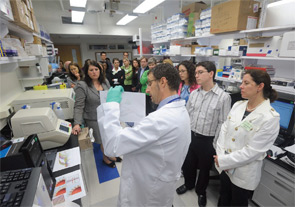
The ACR works to promote clinical and basic research in arthritis and musculoskeletal disease through a variety of channels, including advocacy, working directly with the National Institutes of Health (NIH), and through the work of the ACR Research and Education Foundation.
Arthritis Research and Congress
Each year during hundreds of visits to Capitol Hill, ACR and ARHP members and patient advocates educate Congress on the importance of increased federal funding for arthritis research. It is essential that members of Congress understand the impact that arthritis, rheumatic, and musculoskeletal diseases have on one’s quality of life and how new and improved treatments can drastically alter patient outcomes. That is why the ACR has been a leading member of a coalition dedicated to increased understanding of the valuable research being conducted at the National Institute of Arthritis and Musculoskeletal and Skin Diseases (NIAMS).
The NIAMS Coalition consists of over 70 medical, patient advocacy, and research organizations dedicated to finding cures and better treatments for bone, joint, muscle, and skin diseases. The coalition members are diverse, ranging in purpose from promoting research to disease awareness and education but are united in the effort to elevate the value of NIAMS among policy makers and the public.
In addition to each organization’s individual outreach efforts, the NIAMS Coalition works together to make a larger impact on key policy makers. In October 2010, the coalition sponsored a NIAMS Awareness Day that brought congressional staff to the NIH campus. Staff heard scientific presentations and toured NIAMS labs for a firsthand look at the institute’s innovative research. The experience was invaluable in building awareness on Capitol Hill about the cutting-edge technology and research advances that have led to significant improvements for patients with arthritis, musculoskeletal, and skin diseases.
The Coalition will work closely with NIAMS staff in promoting and participating in the NIAMS 25th Anniversary Scientific Symposium. The symposium will be held on Monday, June 13, 2011, bringing researchers, healthcare providers and patients from across the United States to the NIH campus. The day-long event will feature scientific advances made possible with NIAMS support, highlight how these advances have improved patients’ lives, and address future directions for NIAMS research.
The ACR will continue to collaborate with the coalition and NIAMS, in addition to pursuing our own advocacy efforts, to ensure Congress recognizes the value of NIAMS research and its role in improving the lives of millions of patients who suffer from chronic disease.
NIH Relations
In addition to these efforts, the ACR Committee on Research established a Subcommittee on NIH Relations in 2010. The subcommittee is charged with developing and maintaining relations between the ACR and various NIH Institutes and Centers that have not traditionally played a major role in supporting rheumatic disease–related research.
The overall goal is to establish working relationships similar to our longstanding relationships with NIAMS and the National Institute of Allergy and Infectious Disease. Through these new relationships, we are able to communicate the ACR’s research agenda, identify new funding opportunities, and foster and facilitate the exchange of ideas in consideration of future funding opportunities.
REF Bridge Funding
The ACR Research and Education Foundation (REF) also works closely with NIAMS and other relevant NIH Institutes and Centers to ensure the future of our academic workforce. As reductions in overall NIH funding have resulted in scientifically sound applications going unfunded, the REF continues to bridge this funding gap through the Career Development Bridge Funding Award, co-funded with the Arthritis Foundation.
This award is designed to provide short-term support for our rheumatologist and rheumatology health professional constituents who have applied for K23 or K08 mentored career development awards that have strong scientific merit but will not be funded by NIH in this cycle. We believe that this support will provide the encouragement they need, as well as allow protected time from their institutions, that will lead to success in obtaining their K awards and ultimately to independent funding.
Promoting research funding is vital to bring about the treatments and cures needed to improve the quality of life for patients suffering from rheumatic disease.
